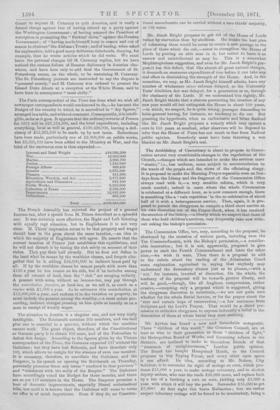Mr. Jacob Bright proposes to get rid of the House
of Lords. rather by starvation than by abolition. He thinks the best plan of reforming them would be never to create a new peerage in the place of those which die out,—never to strengthen the House of Lords by putting an able man in it, but rather to leave it as narrow and uaintellectual as may be. This is a somewhat Mephistophelean suggestion, and even for Mr. Jacob Bright's per- pose it has this defect, that like almost all great natural changes, it demands an enormous expenditure of time before it can take any real effect in diminishing the strength of the House. And, in the meantime, we may, as Mr. Jacob Bright himself admits, have any number of wholesome minor reforms delayed, as the University Testa' Abolition Act was delayed, for a generation or so, through the obstinacy of the Lords. If we understand him rightly, Mr. Jacob Bright thinks that a statute preventing the creation of any new peer would all but extinguish the House in about 150 years, —in which, we suspect, he is quite wrong, peerages descending to heirs-general having, for instance, no tendency to die out. But granting the hypothesis, when an enthusiastic and bitter Radical, like Mr. Jacob Bright proposes a remedy which may operate a. cure in 150 years at smallest, sober observers will be disposed to- infer that the House of Peers has not much to fear from Radical public opinion. Somebody must have been throwing a wet• blanket on Mr. Jacob Brightie zeal.


































 Previous page
Previous page